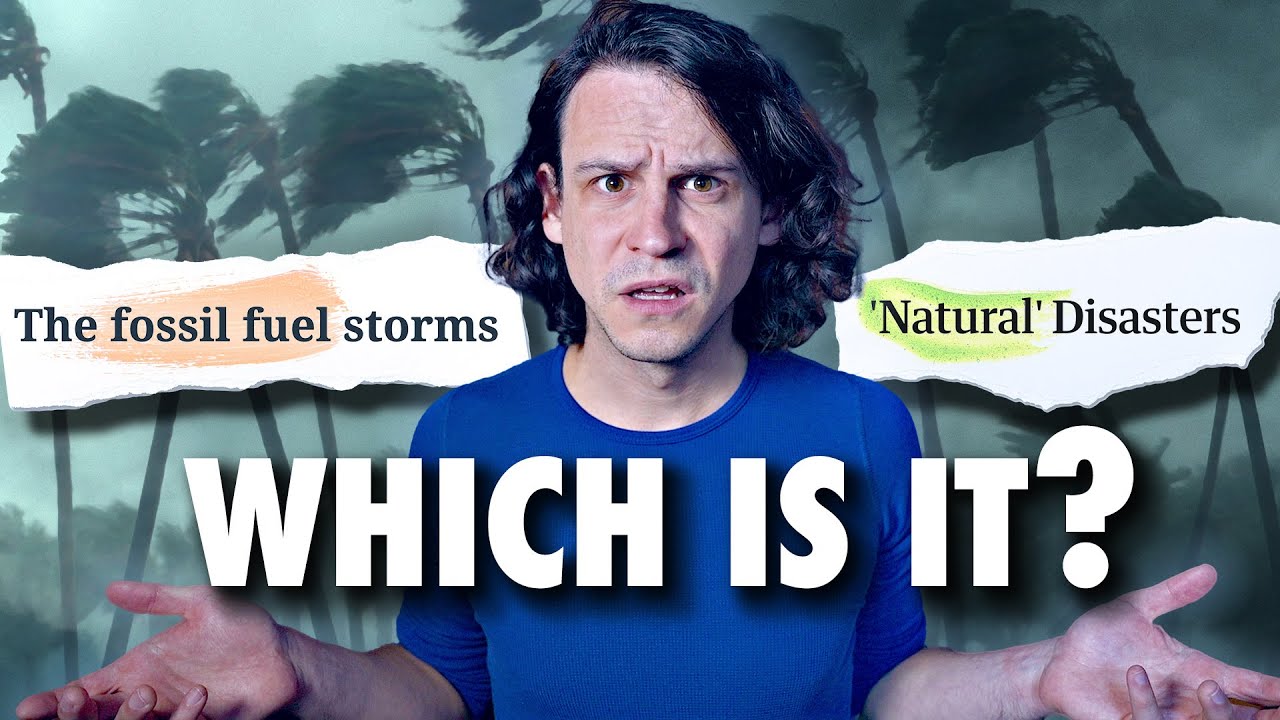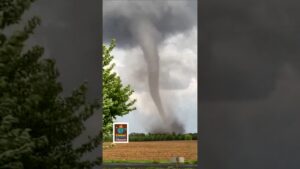
From hurricanes like Helene and Milton, to typhoons like Gaemi, vast storms are causing devastation: destroying cities and tearing up lives. So what’s actually behind these tropical cyclones? Are they just natural disasters, or caused by burning fossil fuels? The links between climate change and these storms are crucial, but they’re also complex. So let’s talk about how global warming is turning up the heat on hurricanes, and what we can do to shelter from the storm.
Huge thanks to Dr Fredi Otto for her input https://twitter.com/frediotto
0:00 Intro
0:34 Let’s talk storms
1:48 Helene & Milton
3:20 Controlling weather conspiracy
4:48 Typhoons
5:28 Typhoons vs Hurricanes vs…
5:48 How these storms work?
7:18 Climate change and 2024’s storms
9:18 How storms are changing
11:23 Climate change vs Natural
12:05 The future of storms
12:37 Protecting ourselves
Support ClimateAdam on patreon: http://patreon.com/climateadam
#ClimateChange #hurricane #hurricanemilton #hurricanehelene
twitter: http://www.twitter.com/ClimateAdam
instagram: http://instagram.com/climate_adam
==MORE INFO==
World weather attribution assessment of Helene https://www.worldweatherattribution.org/climate-change-key-driver-of-catastrophic-impacts-of-hurricane-helene-that-devastated-both-coastal-and-inland-communities/
Economic damages of Helene and Milton https://www.imperial.ac.uk/news/257054/climate-change-behind-almost-half-cost/
Long term deaths due to hurricanes https://www.nature.com/articles/s41586-024-07945-5
IPCC summary of science on hurricanes and climate change https://www.ipcc.ch/report/ar6/wg1/chapter/chapter-11/#11.7.1
Names of tropical cyclones https://oceanservice.noaa.gov/facts/cyclone.html
Extending to category 6 https://www.pnas.org/doi/full/10.1073/pnas.2308901121
Helene budget blowing disaster https://subscriber.politicopro.com/article/eenews/2024/10/10/fema-spent-nearly-half-its-disaster-budget-in-just-8-days-00183131
==THANKS==
SLR, warming and sea surface temperature visual from NASA’s Scientific Visualization Studio
Super Typhoon Yagi and Helene and Milton, and Gaza visuals from Kanal13
ISS footage from NASA
Storm surge clip from LearningNowHere sg
hurricane dorian footage from Sensible Driver
Haiyan visual, 2021 hurricane season, katrina and hurricane path from NOAAVisualizations
Helene footage from geo radar
source




I can make vids without selling you rubbish, thanks to amazing patrons like Ingrid Zabel and Linda Baker. Join them here https://www.patreon.com/ClimateAdam – you'll get video sneak peeks too!
Thanks for another great vid, Adam! Appreciate you dissecting the complexities and nuances in such a clear and timely way !
Do you think it's plausible that shipping industry regulation that slashed SO2 emissions and accidentally led to a sharp spike in Atlantic sea surface temperature starting last year could have any role in the severity of this year's hurricane season? Like it's a sobering thought is that perhaps the effect of climate change on tropical storm geophysics has been being masked this whole time by SO2 pollution, and this year is the first year where we've actually sampled its baseline
Re the title, I don't know.
But climate change denial is certainly fuelling MAGA storms.
Thanks, Climate Adam, as always.
11:48 Story of my Life.🤣🤣🤣
No comment.
It's telling that things are so bad people aren't even trying to deny the climate crisis anymore.
For da algorithm
I was watching this in the future but now I'm stuck in the past.
Thanks for this!
I like to remind myself that because energy is proportional to velocity squared, a seemingly small increase in wind speed adds a lot more energy than people might think. Also applies to driving.
This is a great video addressing all sides in an engaging manner! Very satisfied subscriber 🙂
Unless you are in the pocket of Big Oil (like US congress)… Yes! CO2 climate change is to blame.
We should start naming the hurricanes on names of US congressmen notable for climate responsibility.
Hey Adam, are you aware of the letter "Open Letter by Climate Scientists to the Nordic Council of Ministers Reykjavik, October 2024" , if so please make a video explaining the serious risk and the time frame we are looking at.
I really like watching your videos since it is easy for anyone to understand the risk we are facing regarding climate change. Thank you and keep up the good work 👍
ARE YOU FEELING THE PANIC OF THE US ELECTIONS ?, i am, ANOTHER BRILLIANT PIECE OF WORK. Thankyou j.
Commenting on the damage of Hurricane Helene, occisoft8082 writes: "Water is heavy. Say you have 1000×1000 feet of surface area, and the region receives a foot [12 inches] of rain in a day, which is what North Carolina received, that's 1,000,000 cubic feet of water. At 63 lbs per cubic foot of water, that's 63 million pounds of water moving down the mountain. The mountains are sculpted to direct all that rain into those little creeks."
we can put things back in balance or nature will do it for us
I just wanted to clarify that HUNDREDS of people were killed by Helene and Milton, not just dozens. Otherwise, really great video. Thank you as always, Adam!
the thing is, as we get hotter summers year by year and thus, people needing for cooling devices such as air conditioners and the like, the more it will harm the planet bc devices like air conditioners also emit CFC's, one of greenhouse gas types
what we need is to plant more trees and lessen usage of vehicles that are powered by gas in order to cool down a city bit by bit.
It's odd how we're focussed on the climate change as an event, that there's climate change moments. The other side of the risk we face is not the moment the event happens, but our ability to recover from it – what might become overall a never ending recovery effort. If you look at the discussion happening on recovering and safeguarding the area of Ahr Valley, the biggest initial challenge is not even doing the recovery, but how the recovery should happen, or if it should happen at all for some locations. In the US The Small Business Association is nearly out of funds providing support loans that rebuild homes and businesses after Milton and Helene. At some point our ability to 'fully' recover is going to stall or even stop, we'll be treading water; abandoning some areas, moving to new areas and trying to rebuild what's left all at the same time, in multiple places with one just starting, one being done, another nearly finished.
Florida did not experience a direct hurricane hit for 10 years in a row, from 2005 to 2016. Climate change responsible for that also?
Hi Adam!
I hope there's hope for us. I don't want to see human civilization collapsing.
This I can guarantee, hurricanes and high intensity storms will drop off drastically in 2025 the first year Trump is in the office.
He will have full power of the corrupt side of weather modification under military control.
Very clear. Do you make transcripts available for edit? Some won't watch but will read. My takeaway is that CC is making a qualitative difference to the impact of the same quantitative phenomena of hurricanes
I imagine Saturn's red spot on earth.
Watched for some minutes and so far he has not said anything.
Loved this episode. Couldn't see anything I disagreed with and the use of all the characters was brilliant, you hired some really great actors.
The only thing I'd like to add is that hurricanes are like engines; they feed off of higher ocean temps, the atmosphere's also warmer which means it can hold more moisture and also adds to the fuel. It's also worth noting that there has been an abrupt rise in ocean and atmospheric temps, the last 2 years have been anomalous and there seems to be a trend that it will continue to accelerate on average.
Some theories of why this is happening is that:
-Carbon sinks, notably the Amazon, have gone from sinks to net emitters.
-Permafrost melt is also another biggy.
-Forest fires and deforestation in general are unprecedently widespread due to myriad reasons.
-Higher libido due to ice melt.
-Wetlands drying out.
-The list goes on…
All of the above are knowns, there are probably unknowns too. They're positive feedback loops which means they are accelerating the heating process and the more heat we have, the more it amplifies these changes (hence 'feedback loop.') Another term is that they have a cascading effect, so they increase the heating rapidly and after a certain point they trigger other positive feedback loops. Not looking good.
i actually laughed out loud at the relationship joke lmao
Great vid and the hair's almost back. A good day after all despite all (and a wave to @DrGilbz)